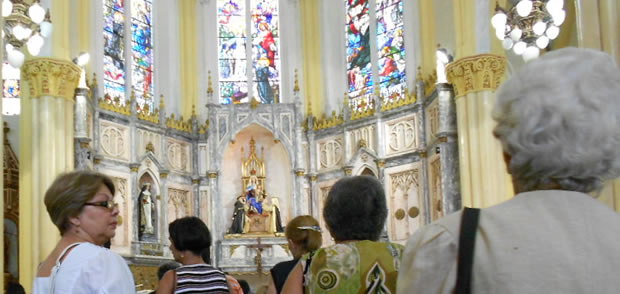
Cuban bishops publish pastoral letter
HAVANA – On Sunday Sept. 15, at all Catholic churches on the island, the faithful received one copy per family of the pastoral letter titled “Hope Does Not Defraud.”[*]
It is signed by the 13 active bishops, including the two Cuban archbishops: Cardinal Jaime Ortega Alamino of the City of Havana, and the Archbishop of Santiago de Cuba, Dionisio García.
The letter was signed on Sept. 8, the day of La Caridad del Cobre, patroness of all Cubans, but its publication was delayed until the 15th, the 20th anniversary of the famous pastoral letter “Love Hopes All Things.”[**]
From love to hope in the course of 20 years, the new pastoral letter, which consists of 43 points, addresses important issues of national life from the perspective of the Cuban Catholic Church.
The letter acknowledges that several of the issues addressed in the 1993 pastoral letter have been met and “we want to see in all this [the hand of the current government] […] the beginning of increasingly broader reforms for the good of the people.”
At the same time, it counsels Cubans to wait until “other actions that we consider necessary are achieved, because the citizenry is experiencing urgency.” The letter associates the urgency mainly with the youth “who cannot yet see the conditions to achieve their life projects” and choose to emigrate.
The resistance to change, according to the letter, is based partly on the fact that the changes generate uncertainty about the future, and also to ideological factors “that have been prolonged in time” without considering that “reality has evolved.”
Poverty – another of the issues mentioned – which purportedly is widespread in the country, is the result of insufficient wages, the letter says. Highly qualified sectors, which are considered as human capital, suffer economic limitations too, the letter adds.
Those sectors have been waiting for a long time “to put [their knowledge and potential] at the service of themselves and society.” The mismatch in the social project is not only frustrating but also motivate some to emigrate, the document says.
Among the missing aspects, the letter says that – as it has happened in the economic arena (in a clear reference to the changes) – “we believe that, in our Cuban reality, it is imperative to implement an actualization or update of the nation’s laws, in political terms.”
Referring to the open spaces “of debate and discussion” occasionally “created by the citizens themselves,” the letter states that Cuba’s society is pluralistic and “diversity leads to dialogue.” The letter believes that dialogue “is the only road to achieve and sustain the transformations taking place in Cuba.”
The pastoral letter devotes Point 37 to the émigrés and their descendants, “who continue to consider themselves Cubans and love Cuba.” It calls for an inclusive policy that respects differences and allows to alleviate the tensions and suffering experienced by numerous persons and families, as well as a commercial exchange that is fair and intended for the benefit of all.”
[*] Translator’s Note: This title is adapted from the Bible: Romans 5:5.
[**] T.N.: This title is adapted from the Bible: I Corinthians 13:7.
Progreso Semanal/ Weekly authorizes the total or partial reproduction of the articles by our journalists, so long as source and author are identified.
(Photo by Ramy)


